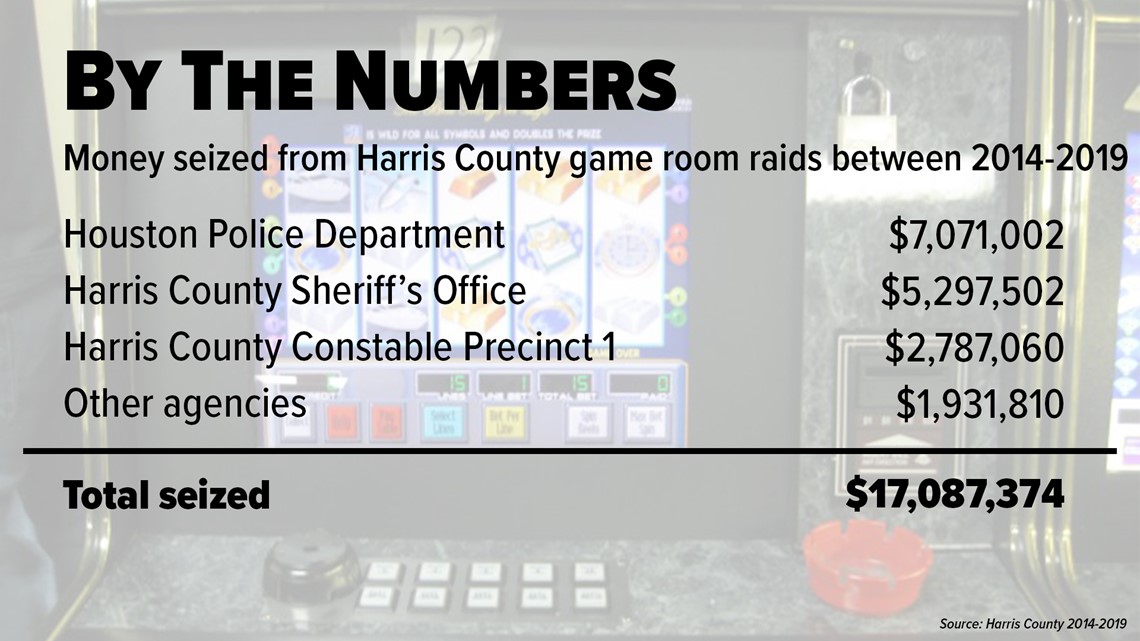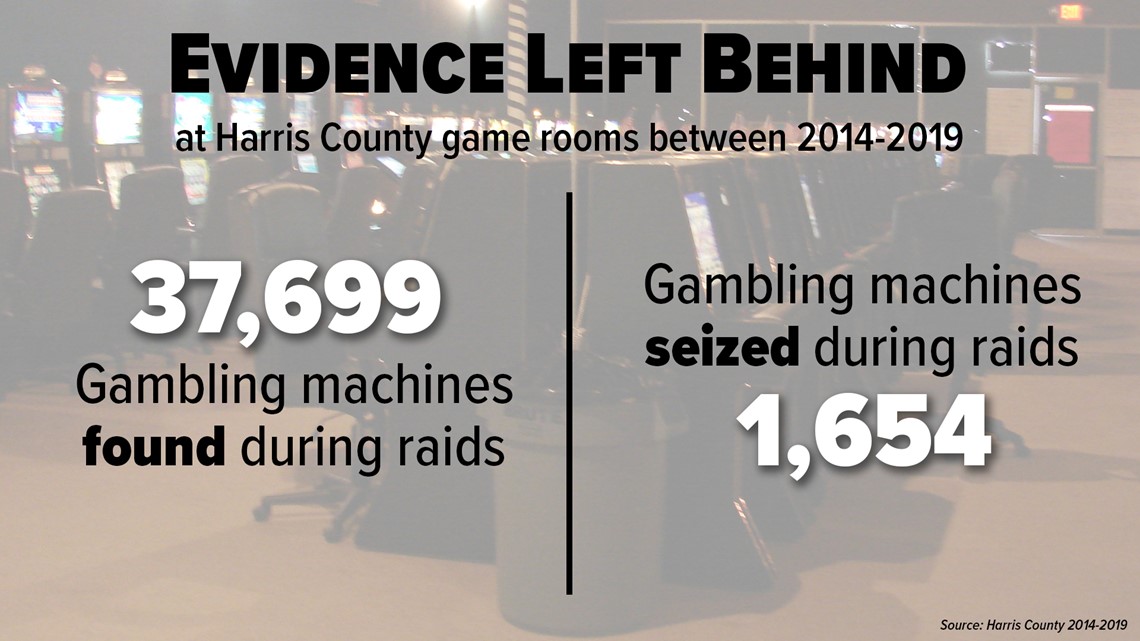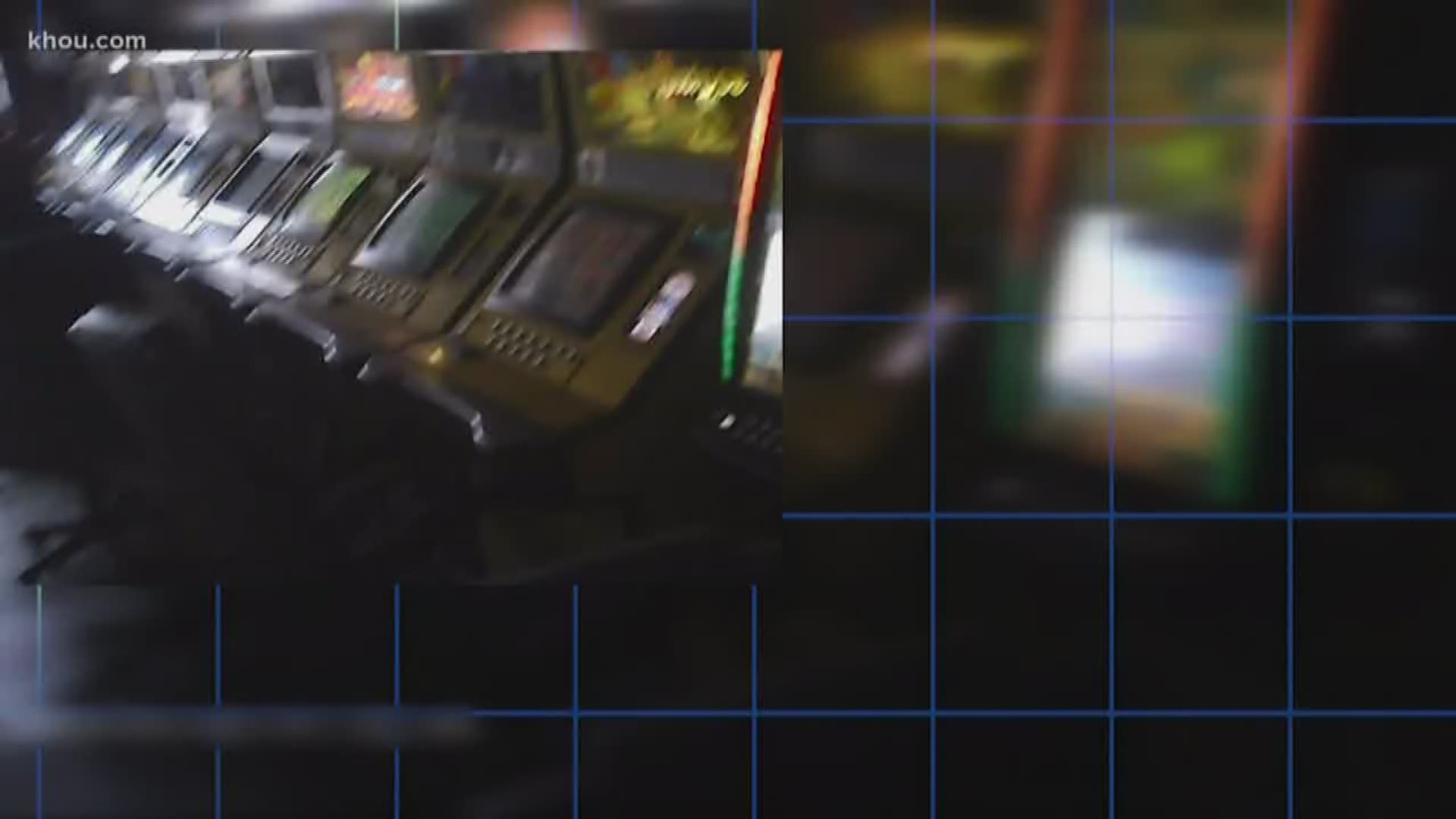HARRIS COUNTY, Texas — Law enforcement agencies are cashing in on millions seized from illegal game rooms in Harris County, despite no one getting convicted in more than half of those police raids, according to an analysis of court records by KHOU 11 Investigates.
A review of nearly 600 forfeiture cases from 2014 through 2018 revealed a pattern of police work that pads law enforcement budgets but does little to shut game rooms down: Police raid the establishment, seize the cash and a few machines. Sometimes no charges are filed, and, if they are, the case either gets dismissed or results in a short jail sentence. The game room opens back up, and police raid it again.
“The cycle repeats,” said Institute for Justice attorney Anya Bidwell “We call it policing for profit.”
Bidwell works in the Austin office of the Institute for Justice, a national non-profit that advocates for forfeiture law reform.
“Instead of obtaining conviction and stopping the crime from happening, you actually just get to take the money and use it for your own benefit,” Bidwell said.
KHOU 11 Investigates hidden cameras were able to find previously raided game rooms back up and running.
For example, court documents show authorities raided a game room on Tidwell Road in northeast Houston twice in two years. In each case, police arrested a clerk for possession of a gambling device.
Both of those cases were later dismissed, one because prosecutors “could not prove this (defendant) committed offense (beyond a reasonable doubt).” Under Texas forfeiture laws, officials kept more than $25,000 seized because nobody came forward to contest the confiscated money.
The game room later opened back up and is still in business.
In southeast Houston, a game room on Lawndale Street was raided three times in four years. In each case, the Harris County Precinct 1 Constable Office arrested a clerk in the business.
Records show no one was charged in one case, another was later dismissed and a third defendant received four days in jail after pleading guilty to misdemeanor charges. Police confiscated and kept more than $34,000 from those three raids and the game room was once again back in business this month.


$17 MILLION SEIZED WITH LOW CONVICTION RATE
It is all allowed under Texas forfeiture laws, and it’s big money for law enforcement. From 2014 through 2018, police agencies in Harris County seized more than $17 million from game rooms. But 55 percent, more than half, of those raids resulted in no convictions, according to a review of Harris County District Clerk records.
Agencies have wide discretion on how to use the funds as long it’s for a “law enforcement purpose.” That could include everything from training and travel to conferences, to buying new cars, drones and office furniture.
A KHOU 11 Investigates analysis found the Houston Police Department seized $7 million over those five years, the most of any agency in Harris County. HPD Vice Capt. Jim Dale acknowledged there is a profit incentive to enforcing game room cases.
“I believe there is,” Dale said. “We can use that money to go back after them.”
Other law enforcement officials maintained that money does not factor into how they combat gambling crimes.
The Harris County Precinct 1 Constable Office seized $2.7 million from game room raids over the past five years. Constable Alan Rosen replied “absolutely not” when asked if “policing for profit” accurately describes gambling enforcement.
“Every one of those people, every single one of them, conviction or no conviction, had the right to go back to court and ask that court for that money back, they just have to establish that it wasn’t illegal,” Rosen said.
Under the Texas Code of Criminal Procedure, notices must be sent to the person found in possession of gambling devices. They have 20 days to prove that the proceeds are not gambling related. A review of court records, however, shows that rarely happens.
At the Harris County Sheriff’s Office, investigators seized $5.3 million during game room raids over the past five years.
“The money, I can tell you, doesn’t factor into anything that I do or my people do,” said HCSO Capt. Chris Sandoval, who oversees vice crimes for the department’s special investigations division.
Records show nearly two-thirds of the HCSO raids ended up with no criminal convictions.
“You can spin it any way that you want to spin it,” Sandoval said. “But what we’re doing here is we’re continuing to do what the law tells us to do and try to shut these places down.”
RAID, RE-OPEN, REPEAT
Records show after police shut them down, dozens quickly pop right back up for business. Police agencies raided 89 game rooms more than once over the past five years. Some of them were busted up to eight times.
Law enforcement pointed out that many are shut down by nuisance lawsuits, which are filed in the civil court system. And the Harris County District Attorney’s Office also said it is “changing the paradigm” regarding illegal gambling by pursuing more serious charges against game room owners and operators.
In most cases, the DA’s office keeps 30 percent of money seized, according to court records.
“Our Money Laundering Division led an effort last year that resulted in the arrest of nearly three dozen people, including three police officers and key gambling figures in Chinatown and elsewhere,” a spokesperson for District Attorney Kim Ogg said in a statement.
The spokesperson said police agencies are independent from the district attorney’s office and they determine which locations they want to raid.
“But we encourage them to investigate all possible criminal charges, look for avenues beyond cash seizures and misdemeanor arrests, and to take down criminal enterprises,” the statement read.
But records show over the past five years, authorities rarely filed felony money laundering or organized crime cases that could shut down an operation, instead opting for low-level misdemeanor charges against game room employees, not the owners.
Institute for Justice attorney Anya Bidwell said those charges, with little consequences, result in a “revolving door” of game rooms getting raided and quickly re-opening.
“Instead of cracking down on crime, they’re enabling it to continue to happen,” Bidwell said.
POLICE LEAVE GAMBLING EVIDENCE BEHIND
KHOU 11 Investigates also discovered police agencies may make it easier for game rooms to get back in business by the way they handle gambling evidence. Between 2014 and the end of 2018, records show authorities identified more than 37,000 gambling machines in game rooms, but only seized 1,600, or 4 percent of them.
Several agencies said they simply do not have enough space to store them, and instead confiscate all the circuit boards used to program the machines.
“The motherboards, they’re sort of like the brains. If you take the motherboards, you don’t have anything there,” HPD’s Dale said.


HCSO’s Sandoval dismissed the significance of leaving gambling machines behind.
“No matter what we do—we could take all the devices out of there, all the devices—but you know just as well as I do, criminals are enterprising,” Sandoval said. “They will find a way, no matter what you do, they will come back and do it better or stealthier than before.”
KHOU 11 Investigates also questioned what two agencies do with the gambling equipment they do seize. The Harris County Sheriff’s Office and Precinct 1 Constable Office sell it at a state auction to the highest bidder.
HCSO made $603,000 in the last five years from the auctions, in addition to the money seized during the raids. There’s no assurance of where the gambling devices go from there.
“We’re looking into revamping or re-evaluating what we’re doing,” Sandoval said. “You bring some valid points up.”
Constable Rosen also said he’ll look into the results of his office’s auctioned-off machines, which brought in $216,000 for his agency in recent years.
Records show one man who bought $37,000 of gambling equipment his office seized, was charged with gambling crimes in 2005. That man pleaded guilty and received deferred adjudication, a form of probation.
“So, it’s not a conviction,” Rosen said.
The constable did pledge to speak with the Texas Facilities Commission, which organizes the auctions, to ensure the auctioned-off gambling equipment does not show up in his backyard.
“We can actually work out an agreement that people that buy this equipment have to make a representation that they will not use it in the State of Texas,” Rosen said.
The other option is to destroy the machines so they can never be used again.
That is what the Houston Police Department does.
“It’s just very important, we don’t want to get those things back out there,” Capt. Dale said.
ALSO ON KHOU.COM
- Lawsuits detail how 2 'illegal' Houston poker clubs made over $10 million in a year
- Lawmaker wants to legalize casinos in Texas for hurricane, flooding relief
- Bill could bring gambling back to Galveston, this time legally
- Gambling machines found during fire on property shared with church in N. Harris Co.
- Legal poker clubs in Texas? Don't bet big just yet

